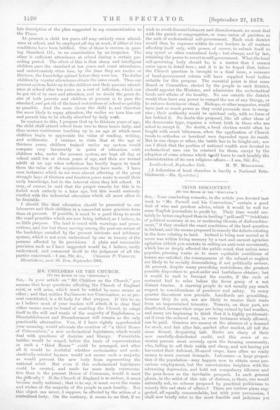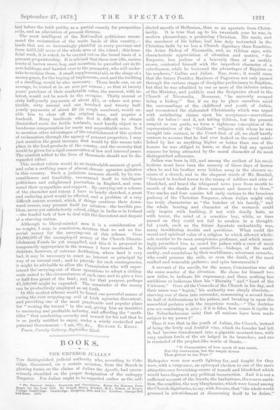IRISH DISCONTENT.
(TO TOR EDITOR OR TES .13PSOTATOR."3 SIR,—Your concluding remarks, in the article you devoted las'a week to "Mr. Parnell and his Convention," contain a good deal of wise and prudent advice, which it would be well for some English journalists to profit by. Their time would cer- tainly be better employed than in hurling " pell-mell"" brickbats of political economy at us, or muttering threats of disfranchise- ment," if they studied the exact conditions of the land question in Ireland, and the means proposed to remedy the defects existing in the laws relating to land. Ireland is being now moved as it never was within living memory by a vast and earnest agrarian agitation (which you mistake in calling an anti-rent movement), which has so deeply affected the public mind, that unless some popular, pressing wants as to more equitable conditions of tenure are satisfied, the consequences of the refusal or neglect are likely to be socially demoralising, if not politically serious. At present, despite many provoking restrictions, the greatest possible disposition to good-order and lawfulness obtains ; but it would be rash to forecast the results, if the curb of restraint had to relax before the, fierce grasp of a not distant famine. A starving people do not usually pay much respect to considerations of prudence and safety. In every quarter discontent now prevails. Landlords are grumbling, because they do not, nor are likely to receive their rents from an impoverished tenantry. Tenants, on their part, are disaffected, because their crops are being ruined by bad weather, and. many are beginning to think that it is highly problemati- cal if even the reduced rent, in some instances wisely allowed, can be paid. Graziers are uneasy at the absence of a demand for stock, and fair after fair, market after market, all tell the same dismal, despairing tale. Banks are chary of their now carefully-distributed credit, and this screw of re- straint presses most severely upon the farming community, who, failing to sell their cattle and sheep, and not having yet harvested their deficient, ill-saved crops, have often no ready money to meet current demands. Labourers—a large propor- tion. of the population—may happen now to obtain some pre- carious employment, but the uncertainties heighten with the advancing depression, and hold out compulsory idleness and the poor-house as the inevitable prospect. In such general gloom, in the midst of this tale of distress, is there, one would naturally ask, no scheme proposed by practical politicians to remedy this sad state of affairs P There are various plans sug- gested, all equally commendable, but with your permission, I shall now briefly refer to the most feasible and judicious yet
laid before the Irish public, as a partial remedy for prospective evils, and an alleviation of present distress.
The moat intelligent of the Nationalist politicians recom- mend the reclamation of the waste lands of this country,— lands that are Bo increasingly plentiful in every province and form 4,651,527 acres of the whole area of the island ; this belie. ficial work, it is asked, to be carried out on the broad basis of a peasant-proprietorship, It is advised that these now idle, useless tracts of barren moor, bog, and mountain be parcelled out in 20- acre holdings, and handed over to the peasantry, who will under- take to reclaim them. A small supplemental aid, in the shape of a money grant, for the buying of implements, eeecl, and the building of a dwelling, would be also necessary. These lands can, on an average, be rented at 5s. an acre per annum ; so that at twenty years' purchase of their marketable value, the amount, with in- terest, would not be much to the occupier. Thirty annual or sixty half-yearly payments of about 215, or where not prac- ticable, sixty annual and. one hundred and twenty half- -yearly payments of about £9 (in rough numbers), would en- able him to clear off the original loan, and. acquire a freehold. Many landlords who find it difficult to obtain diminished rents for fertile lowlands, need hardly object to a handsome compensation for waste and, unprofitable acres. Not to mention other advantages of the establishment of this system of reclamation through the agency of peasant properties, I may just mention the great increase that would by this means take place in the food-products of the country, and the security that would be given for a rigid conservation of law and internal peace. The comfort added to the lives of thousands should not be dis- regarded either.
This modest reform would do an incalculable amount of good, and calm a seething mass of almost chronic agrarian aitation in this country. Such a judicious measure should, by its rea- sonableness and. feasibility, recommenl itself to intelligent politicians and enlightened journalists in England, and com- mand their sympathies and support. By carrying out a scheme of the character and Went I have so briefly sketched, a great and enduring good would be effected, aud a problem of a very difficult nature averted, which, if things continue their down- ward course, may present itself for solution—the terrible pro- blem, never yet satisfactorily solved, either in India or in Ireland —the fearful task of how to deal with the discontent and despair of a starving nation.
Although to liberal-minded men it is a consideration of no weight, I may, in conclusion, mention that we ask no Im- perial money for the carrying-out of this scheme. Over 24,000,000 of the unemployed money of the Church Disesta. blishment Funds lie yet unapplied, and this it is proposed to temporarily appropriate in the manner I have mentioned. In districts, however, of extreme destitution, where land is very bad, it may be necessary to exact no interest or principal by way of an annual rent ; and to provide for such contingencies, it might be advisable to allow the Commiesion who will super- intend the'carrying-out of these operEttions to adopt a sliding. scale suited to the circumstances of each case, and to give a free or half-free grant of the land; and for that purpose, perhaps £1,500,000 might be expended. The remainder of the money can be productively employed as set forth. In this modest scheme would be found. one powerful means of curing the ever cropping-up evil of Irish agrarian discontent, and providing one of the most practicable and popular plans for "rooting the tenant" in the soil, giving him an incentive to unceasing and profitable industry, and affording the "earth. tiller" that comforting security and. reward for his toil that he is so justly entitled to enjoy, under a wisely controlled and paternal Government. --I am, Sir, &e.„ RICHARD L. KELLY.
Tuam, County Galway, September 22nd.



































 Previous page
Previous page